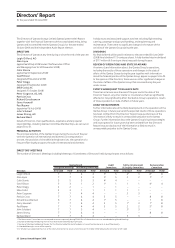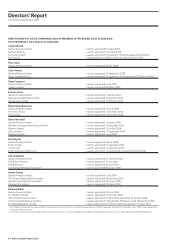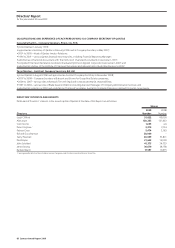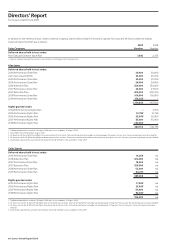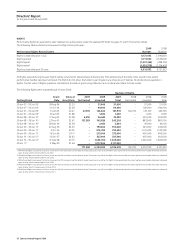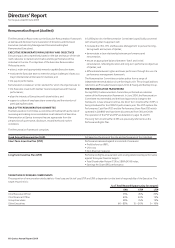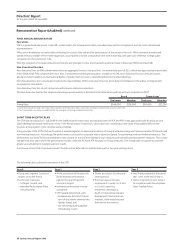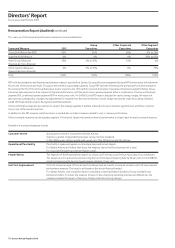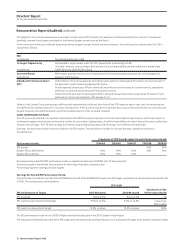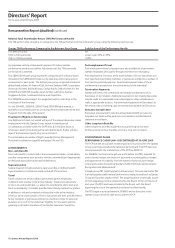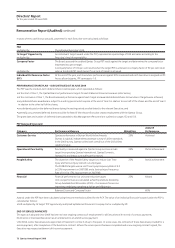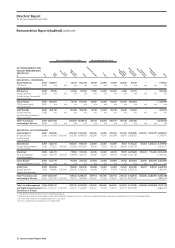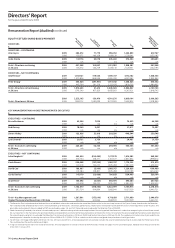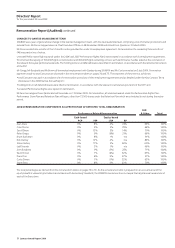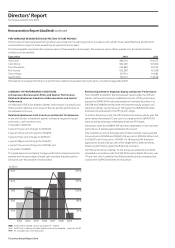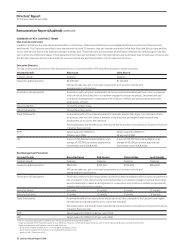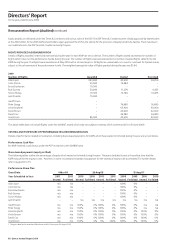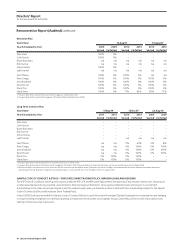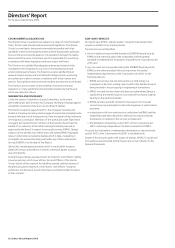Qantas 2009 Annual Report Download - page 74
Download and view the complete annual report
Please find page 74 of the 2009 Qantas annual report below. You can navigate through the pages in the report by either clicking on the pages listed below, or by using the keyword search tool below to find specific information within the annual report.
72 Qantas Annual Report 2009
Directors’ Report
for the year ended 30 June 2009
Relative Total Shareholder Return (TSR) Performance Hurdle
The TSR performance of Qantas is compared to the TSR performance of the comparator group, using the following vesting scale:
Qantas TSR Performance Compared to the Relevant Peer Group Satisfaction of the Performance Hurdle
0 to 49th percentile Nil
50th to 74th percentile Linear scale: 50% to 99%
75th to 100th percentile 100%
A progressive vesting scale prevents payment for below median
performance and does not deliver full reward until the 75th percentile
performance is achieved.
TheS&P/ASX100peergrouprepresentscompanieswithordinaryshares
includedintheS&P/ASX100Indexonthedatetheperformanceperiod
commences for each grant. The Airlines peer group comprised a basket of
global listed airlines: Air France-KLM, Air New Zealand, AMR Corporation
(American Airlines), British Airways, Cathay Pacific, Delta Airlines (for the
2004/05 and 2005/06 awards), Japan Airlines, Lufthansa, Ryanair,
Singapore Airlines, Southwest Airlines and Virgin Blue.
The 2008/09 award is subject to a single test (with no retesting) at the
conclusion of the third year.
For the 2004/05, 2005/06, 2006/07 and 2007/08 Rights awards, a
quarterly or six-monthly test occurs during the period between three and
five years from the date of the award.
Treatment of Rights on Termination
Any Rights which have not vested will lapse if the relevant Executive ceases
employment with the Qantas Group, except in limited special
circumstances provided under the DSP Terms & Conditions (such as
retirement, death or total and permanent disablement). Rights will also
lapse if the Executive is guilty of gross misconduct.
The grant date and number of Rights awarded to Key Management
Personnel is outlined on page 80 and pages 134 and 135.
OTHER BENEFITS
Non-cash Benefits
Non-cash benefits, as disclosed in the remuneration tables, include salary
sacrifice components such as motor vehicles, memberships of appropriate
professional associations and travel entitlements.
Superannuation
Superannuation includes statutory, salary sacrifice or defined benefit
superannuation contributions made on behalf of Executives.
Travel
Travel concessions are provided to permanent Qantas employees,
consistent with practice in the airline industry. Travel at concessionary
prices is on a sub-load basis, i.e. subject to considerable restrictions and
limits on availability. It includes specified direct family members or parties.
In addition to this and consistent with practice in the airline industry,
Directors and a small number of Senior Executives and their specified direct
family members or parties are entitled to a number of trips for personal
purposes at no cost to the individual. Eligibility for new participants is
generally restricted to members of the Qantas Executive Committee.
Post-employment Travel
Post-employment travel concessions are also available to all permanent
Qantas employees who qualify through retirement or redundancy.
Post employment, Directors and a small number of Senior Executives and
their specified direct family members or parties are entitled to a number of
free trips for personal purposes. An estimated present value of these
entitlements is accrued over the service period of the individual.
Termination Payments
Qantas will honour the contractual and statutory entitlements of its
Executives on termination. Additional payments to terminating Executives
may be made to a reasonable level where legal or other considerations
make it appropriate to do so. Any termination payment will be subject to
the relevant law concerning caps on termination payments to Executives.
Statutory Annual Leave
Executives are assumed to take the annual leave benefit as it accrues.
Any leave not taken will be paid out on termination and disclosed as
statutory annual leave.
Other Long-term Benefits
Other long-term benefits include the accrual of long service leave
for Executives and other benefits which are long-term in nature.
DISCONTINUED PLANS
PERFORMANCE CASH PLAN – DISCONTINUED AT 30 JUNE 2009
The PCP was the annual cash incentive paid to Executives when the Qantas
Group’s earnings exceeded the target set by the Board. The PCP has been
discontinued with the introduction of the STIP for 2009/10.
For 2008/09, the financial target was profit before tax (PBT) adjusted for
restructuring charges, the impact of approved accounting policy changes
and adjustments for volatility from the mark-to-market of open hedge
instruments under Accounting Standard AASB 139 Financial Instruments:
Recognition and Measurement.
A single group PBT target applied to all Executives. This was selected as PBT
is a key budgetary and financial performance measure used both at Qantas
Group and business segment level. The target has been set annually as part
of the budgeting process and approved by the Board. At the conclusion of
each year, the PBT result was provided to the Board, with the Board
approving the size of the payment pool based on these results.
The PBT target was not achieved in 2008/09 and no Executive in the
Qantas Group received a cash bonus under the PCP.
Remuneration Report (Audited) continued



